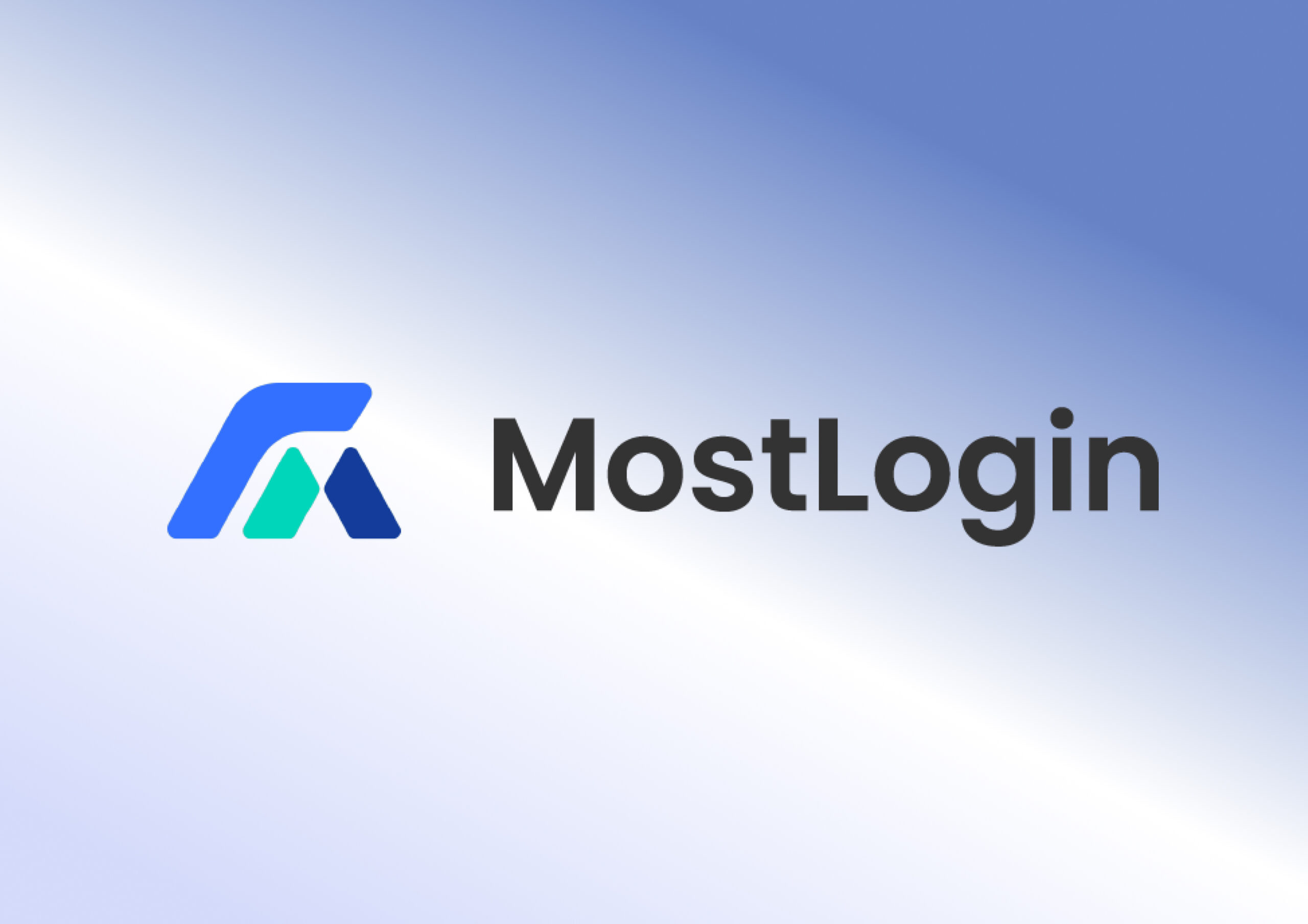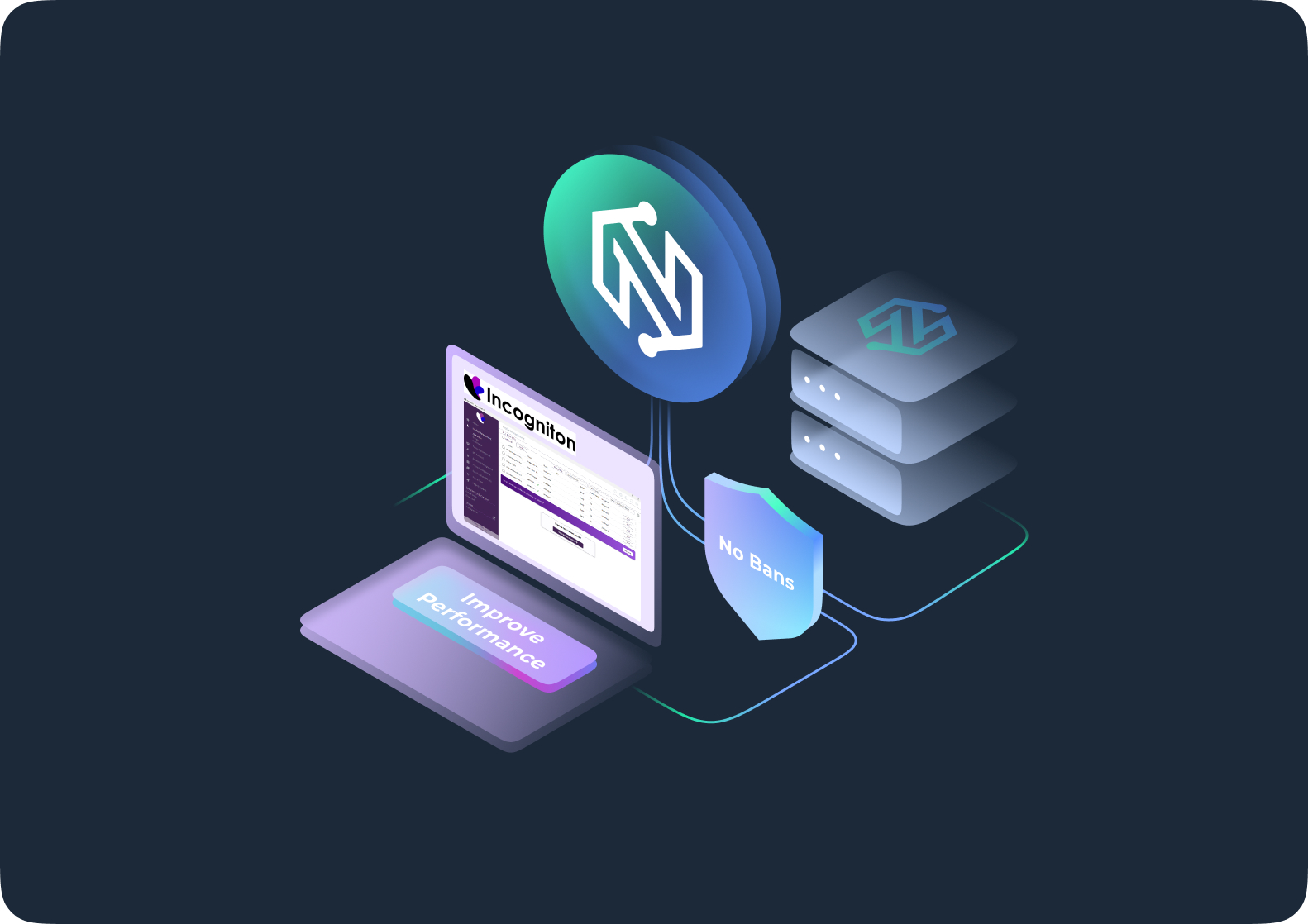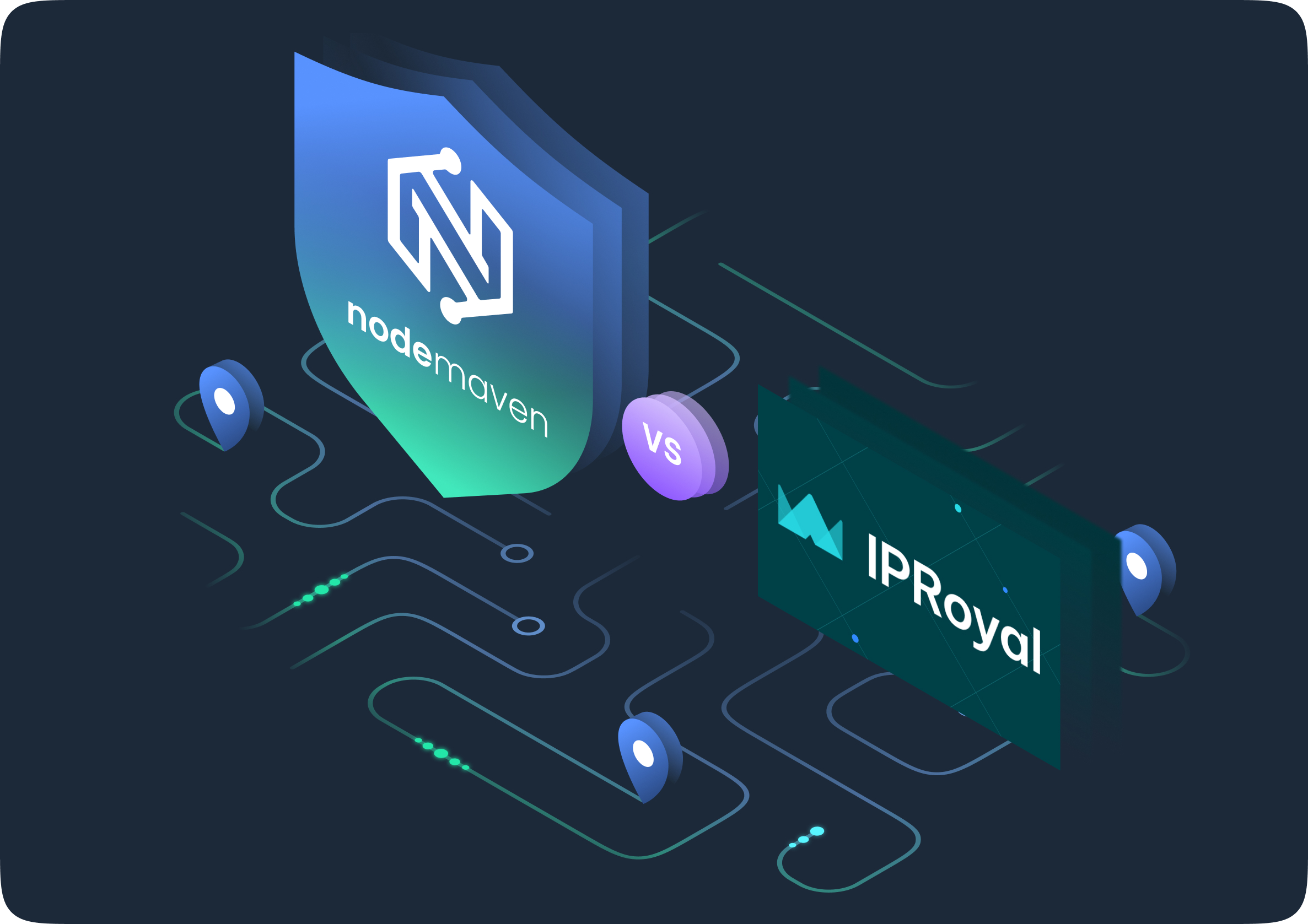In the digital age, access to information and services is crucial. Yet, many people around the world still face internet restrictions that prevent them from freely browsing the web.
Whether it’s a school limiting access to social media, a workplace blocking entertainment sites, or a country censoring certain content, the need for unblocked websites has never been more important.
In this article, we’ll explore what unblocked websites are, why they matter, the most popular ones in 2025, and how tools like proxies can help users bypass these restrictions safely and anonymously.
What Are Unblocked Websites?
Unblocked websites are sites that can be accessed freely without restriction, regardless of the user’s location, network, or device.
These are particularly significant for users facing limitations due to internet censorship, firewalls, or network-level filtering mechanisms.
The Concept of “Unblocked” Sites and Why People Seek Access
The idea behind unblocked websites is simple: unrestricted access to the open internet. Many users seek unblocked sites because they want to:
- Bypass school or office restrictions to access entertainment or communication platforms
- Access geo-restricted content that is unavailable in their country
- Browse freely in regions where certain platforms are banned or censored
- Use educational tools and research resources not permitted on certain networks
Unblocked websites become essential for both personal freedom and productivity, depending on the user’s intent.
Top Visited Unblocked Websites in 2025
As internet censorship increases and network restrictions tighten in schools, offices, and certain countries, several websites continue to stand out as commonly accessed unblocked platforms.
These sites provide a mix of productivity, entertainment, and information that people rely on daily.
- Google Search: The world’s most used search engine remains widely accessible and indispensable for everything from quick lookups to in-depth research.
- YouTube (via mirror sites): Although often blocked directly, users access it through mirror sites or proxy tools to watch educational content, tutorials, music videos, and entertainment.
- Reddit: A massive online forum featuring topic-specific communities where users discuss everything from current events to niche hobbies. Frequently accessed for real-time information and unfiltered discussions.
- Khan Academy: A nonprofit educational platform offering free lessons in subjects like math, science, economics, and more. Rarely restricted and highly popular in academic environments.
- Wikipedia: The world’s largest open-source encyclopedia. Although blocked in some countries, it’s still accessible in most regions and a key reference source.
- Discord (via unblocked proxies): Originally built for gamers, now used widely for community discussions, team collaboration, and study groups. Often accessed via proxies when blocked by schools or institutions.
- Archive.org: Also known as the Internet Archive, this site provides access to old versions of web pages, digital books, and media files. Valuable for researchers, journalists, and digital historians.
- Spotify Web Player: A music streaming service that allows users to listen to playlists, albums, and podcasts from their browser. Sometimes restricted in offices or libraries but commonly accessed via unblocking tools.
- Unblocked Games 66 / Google Sites mirrors: A collection of browser-based games hosted on educational domains or mirrors. These games bypass basic filters and are especially popular among students seeking stress relief.
By providing access to these unblocked websites, users can enjoy educational resources, online communities, and multimedia content even in restricted environments.
Tools like proxies and anti-detect browsers often support this access, ensuring both availability and privacy.
Why Websites Get Blocked in the First Place
Website blocking occurs due to several reasons, each driven by policy, security, or licensing concerns. Understanding these motivations helps users better navigate restrictions and choose appropriate workarounds.
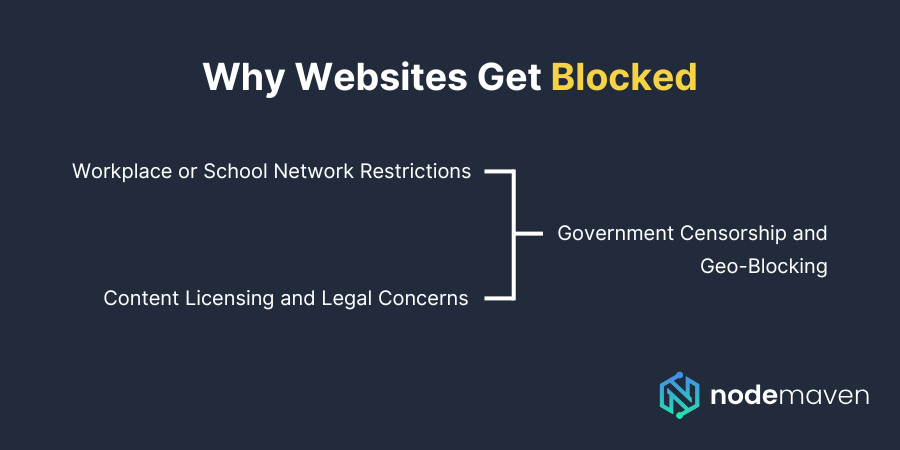
Workplace or School Network Restrictions
Educational institutions and corporate offices often block access to websites deemed non-essential or distracting. The intention is to increase productivity and make sure network bandwidth is not wasted.
Typical targets include:
- Social media platforms like Facebook, Instagram, and TikTok
- Video streaming services such as YouTube and Netflix
- Gaming websites and forums
These restrictions are enforced via firewalls and web filters that identify and block domains or IP addresses.
Government Censorship and Geo-Blocking
In some countries, governments actively restrict access to information. Entire platforms may be banned due to political, cultural, or security concerns. Examples include:
- Blocking social media during political unrest
- Restricting news websites that oppose government views
- Censoring platforms based on moral or religious values
Geo-blocking, on the other hand, is a commercial restriction. Websites like Netflix or Hulu limit content based on regional licensing agreements, preventing access outside certain countries.
Content Licensing and Legal Concerns
Even without malicious intent, websites may be blocked due to legal reasons. Content platforms that haven’t secured international streaming rights may restrict access, or institutions may block torrent sites due to copyright concerns.
Such restrictions may be frustrating for users who travel or relocate but still want to access content they legally purchased.
Popular Categories of Unblocked Websites People Use
Despite restrictions, users continue to find ways to access unblocked websites across different content categories. These categories cover both productivity and entertainment.
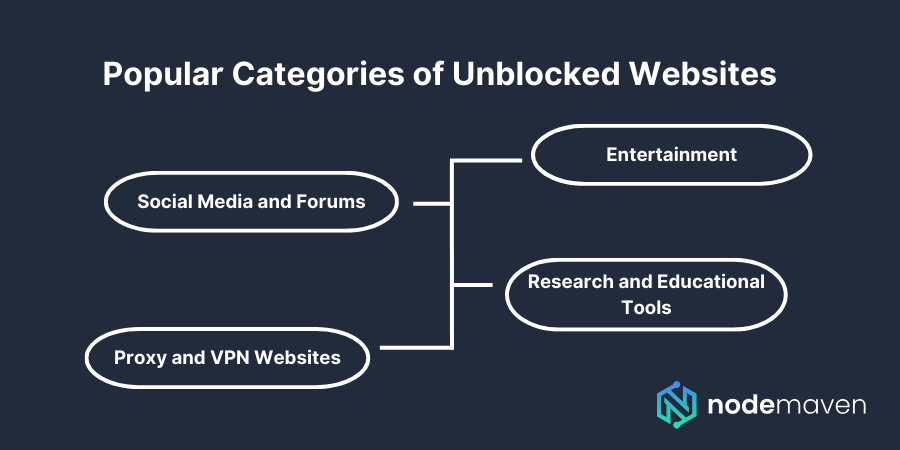
Entertainment (e.g., unblocked games, video streaming)
Entertainment content is among the most commonly sought online. Students often access browser-based games hosted on Google Sites, while office workers stream podcasts or music to maintain focus.
Examples:
- Unblocked Games 66, CoolMath Games
- YouTube mirror sites
- Spotify or SoundCloud via proxy
These sites offer a much-needed break from intense schedules and allow users to unwind.
Social Media and Forums
Platforms like Reddit, Quora, and sometimes even Twitter are considered vital for social connectivity and crowd-sourced knowledge.
Why users seek access:
- To stay updated on real-time events
- For casual conversations with peers
- To participate in hobbyist communities
In restrictive environments, users turn to proxy servers or mobile apps to bypass blocks.
Research and Educational Tools
Education-focused platforms are crucial in academic settings. Unfortunately, some are still restricted due to blanket filters.
Most valued unblocked education sites include:
- Khan Academy
- Google Scholar
- Coursera
- JSTOR (via institution proxy access)
Accessing these websites improves academic performance and research capability.
Proxy and VPN Websites (ironically often blocked themselves)
Ironically, many tools used to unblock websites are themselves blocked. Proxy list sites, VPN providers, and privacy-focused browsers are prime targets.
Still, some mirror versions or decentralized access methods make it possible to reach them.
Sites like:
- HideMy.name
- KProxy
- TorProject.org remain available through lesser-known entry points.
How to Access Unblocked Websites Safely and Anonymously
Bypassing restrictions isn’t just about access—it’s also about staying safe and under the radar. The wrong tools can expose your IP address, lead to bans, or even compromise your data.
Here are the best ways to securely access unblocked websites:
- Proxies: A proxy server acts as a bridge between your device and the internet, masking your original IP. There are several types:
- Rotating residential proxies
- Static residential proxies (ISP)
- Datacenter proxies
- VPNs: Virtual Private Networks encrypt your internet traffic and route it through a remote server. They offer anonymity and are great for accessing geo-restricted content.
- Tor browser: A decentralized privacy browser that routes your connection through multiple nodes. While slow, it is highly secure.
- Smart DNS services: These bypass geo-blocks without masking your IP. Useful for streaming but offer less privacy.
- Scraping browsers and anti-detect tools: Especially important for users managing multiple identities or accounts on restricted websites. These tools mask browser fingerprints and simulate legitimate user behavior.
Security Tips:
- Always check proxy or VPN provider’s reputation
- Avoid free proxy services that may sell your data
- Combine proxies with anti-detect browsers for maximum stealth
NodeMaven: Powering Safe, Fast, and Reliable Access to Unblocked Websites
NodeMaven is a leading proxy provider designed to help users overcome restrictions and access unblocked websites efficiently. Whether you’re a student, marketer, developer, or researcher, NodeMaven provides a powerful suite of tools optimized for stability, anonymity, and speed.
Here’s how NodeMaven supports secure access to unblocked content:
- Residential proxies
- Offers access to real residential IPs from real devices
- Harder to detect and block by websites
- Supports both sticky sessions and rotating sessions for flexibility
- Rotating residential proxies
- Automatically assigns a new residential IP per session or per request
- Great for scraping, search engine usage, and automated tasks
- Maintains geographic targeting (city, state, country level)
- Static residential proxies
- Provide long-term access to the same residential IP
- Ideal for managing social media accounts, accessing email platforms, and creating identity consistency
- Scraping browser feature
- Headless browser infrastructure with stealth mode and anti-fingerprint technology
- Integrates with automation frameworks like Puppeteer and Playwright
- Designed for scalable, high-volume usage while maintaining undetectability
NodeMaven also offers:
- 24-hour sticky sessions for session consistency
- Real-time IP quality filtering to prevent bad or flagged IPs from being assigned
- Support for SOCKS5 and HTTP proxies for advanced user needs
- Access to both mobile and desktop identity emulation for true traffic diversity
With NodeMaven, unlocking websites isn’t just possible – it’s effortless, secure, and scalable.
Unblocked websites play a critical role in today’s web experience. Whether you’re trying to watch a video during lunch, research academic material, or bypass unjust censorship, tools like proxies and anti-detect browsers are your best allies.
With a provider like NodeMaven, users gain not just access, but confidence in their online privacy and productivity. Ready to experience a more open internet?
Choose smart. Choose NodeMaven.
